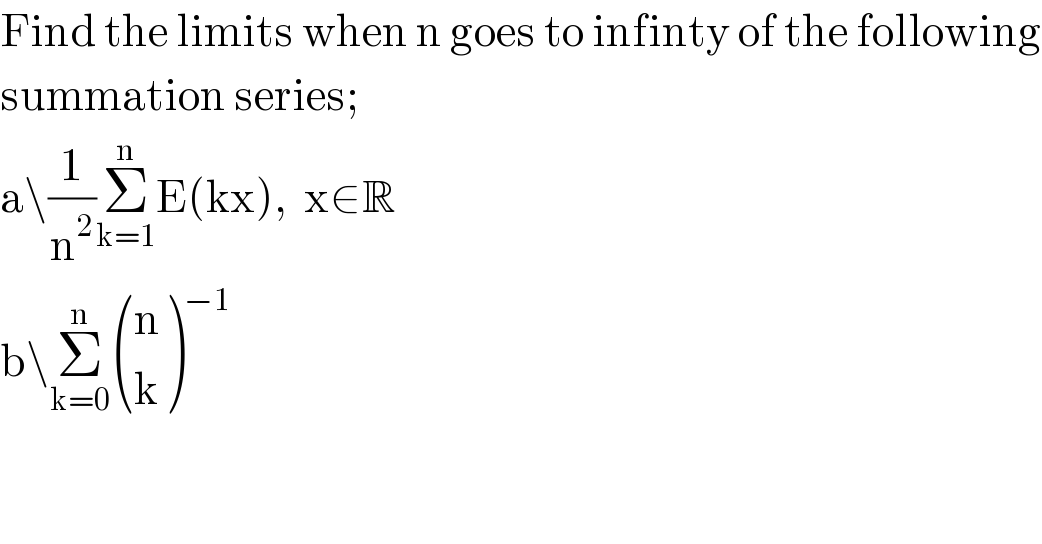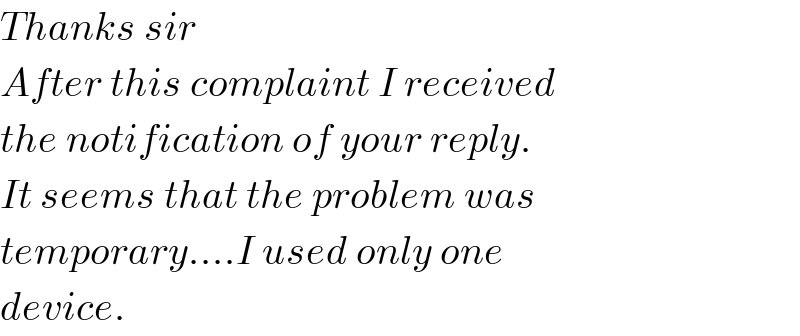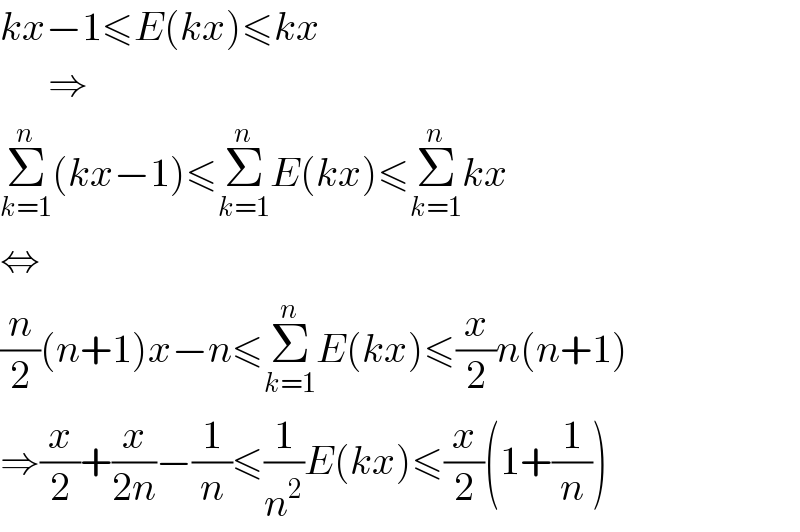
Question Number 99685 by Ar Brandon last updated on 22/Jun/20

$$\mathrm{Find}\:\mathrm{the}\:\mathrm{limits}\:\mathrm{when}\:\mathrm{n}\:\mathrm{goes}\:\mathrm{to}\:\mathrm{infinty}\:\mathrm{of}\:\mathrm{the}\:\mathrm{following} \\ $$$$\mathrm{summation}\:\mathrm{series}; \\ $$$$\mathrm{a}\backslash\frac{\mathrm{1}}{\mathrm{n}^{\mathrm{2}} }\underset{\mathrm{k}=\mathrm{1}} {\overset{\mathrm{n}} {\sum}}\mathrm{E}\left(\mathrm{kx}\right),\:\:\mathrm{x}\in\mathbb{R} \\ $$$$\mathrm{b}\backslash\underset{\mathrm{k}=\mathrm{0}} {\overset{\mathrm{n}} {\sum}}\begin{pmatrix}{\mathrm{n}}\\{\mathrm{k}}\end{pmatrix}^{−\mathrm{1}} \\ $$
Commented by Rasheed.Sindhi last updated on 22/Jun/20

$${To}\:\mathcal{T}{inku}\:{tara},\:{the}\:{developer} \\ $$$${Sir}, \\ $$$${I}\:{don}'{t}\:{receive}\:{noticication}\:{at}\:{the} \\ $$$${moment}. \\ $$
Commented by Tinku Tara last updated on 23/Jun/20

$$\mathrm{Are}\:\mathrm{u}\:\mathrm{logged}\:\mathrm{on}\:\mathrm{to}\:\mathrm{more}\:\mathrm{than}\:\mathrm{one} \\ $$$$\mathrm{device}?\:\mathrm{logout}\:\mathrm{and}\:\mathrm{login}\:\mathrm{again} \\ $$$$\mathrm{from}\:\mathrm{the}\:\mathrm{device}\:\mathrm{to}\:\mathrm{receive} \\ $$$$\mathrm{notification}\:\mathrm{again}. \\ $$
Commented by Rasheed.Sindhi last updated on 23/Jun/20

$${Thanks}\:{sir} \\ $$$${After}\:{this}\:{complaint}\:{I}\:{received} \\ $$$${the}\:{notification}\:{of}\:{your}\:{reply}. \\ $$$${It}\:{seems}\:{that}\:{the}\:{problem}\:{was} \\ $$$${temporary}....{I}\:{used}\:{only}\:{one} \\ $$$${device}. \\ $$
Answered by maths mind last updated on 22/Jun/20

$${kx}−\mathrm{1}\leqslant{E}\left({kx}\right)\leqslant{kx} \\ $$$$\:\:\:\:\:\:\Rightarrow \\ $$$$\underset{{k}=\mathrm{1}} {\overset{{n}} {\sum}}\left({kx}−\mathrm{1}\right)\leqslant\underset{{k}=\mathrm{1}} {\overset{{n}} {\sum}}{E}\left({kx}\right)\leqslant\underset{{k}=\mathrm{1}} {\overset{{n}} {\sum}}{kx} \\ $$$$\Leftrightarrow \\ $$$$\frac{{n}}{\mathrm{2}}\left({n}+\mathrm{1}\right){x}−{n}\leqslant\underset{{k}=\mathrm{1}} {\overset{{n}} {\sum}}{E}\left({kx}\right)\leqslant\frac{{x}}{\mathrm{2}}{n}\left({n}+\mathrm{1}\right) \\ $$$$\Rightarrow\frac{{x}}{\mathrm{2}}+\frac{{x}}{\mathrm{2}{n}}−\frac{\mathrm{1}}{{n}}\leqslant\frac{\mathrm{1}}{{n}^{\mathrm{2}} }{E}\left({kx}\right)\leqslant\frac{{x}}{\mathrm{2}}\left(\mathrm{1}+\frac{\mathrm{1}}{{n}}\right) \\ $$
Commented by Ar Brandon last updated on 22/Jun/20
Thanks ��
Answered by maths mind last updated on 22/Jun/20

$$\underset{{n}\rightarrow\:\infty} {\mathrm{lim}}\underset{{k}=\mathrm{0}} {\overset{{n}} {\sum}}\begin{pmatrix}{{n}}\\{{k}}\end{pmatrix}^{−} \:\:\:? \\ $$
Commented by Ar Brandon last updated on 22/Jun/20

$$\mathrm{I}\:\mathrm{think}\:\mathrm{it}'\mathrm{s}\:\:\overset{\mathrm{n}} {\:}\mathrm{C}_{\mathrm{k}} \: \\ $$
Answered by mathmax by abdo last updated on 22/Jun/20
![a) S_n =(1/n^2 ) Σ_(k=1) ^n [kx] we have [kx] ≤kx<[kx]+1 ⇒kx−1<[kx]≤kx ⇒Σ_(k=1) ^n (kx−1)<Σ_(k=1) ^n [kx]≤Σ_(k=1) ^n (kx) ⇒((xn(n+1))/2)−n<Σ_(k=1) ^n [kx]≤((xn(n+1))/2) ((n(n+1))/(2n^2 ))x−(1/n)<(1/n^2 )Σ_(k=1) ^n [kx]≤((n(n+1))/(2n))x we passe to limit we get lim_(n→+∞) S_n =(x/2)](Q99688.png)
$$\left.\mathrm{a}\right)\:\:\mathrm{S}_{\mathrm{n}} =\frac{\mathrm{1}}{\mathrm{n}^{\mathrm{2}} }\:\sum_{\mathrm{k}=\mathrm{1}} ^{\mathrm{n}} \:\left[\mathrm{kx}\right]\:\:\mathrm{we}\:\mathrm{have}\:\:\:\left[\mathrm{kx}\right]\:\leqslant\mathrm{kx}<\left[\mathrm{kx}\right]+\mathrm{1}\:\Rightarrow\mathrm{kx}−\mathrm{1}<\left[\mathrm{kx}\right]\leqslant\mathrm{kx} \\ $$$$\:\Rightarrow\sum_{\mathrm{k}=\mathrm{1}} ^{\mathrm{n}} \left(\mathrm{kx}−\mathrm{1}\right)<\sum_{\mathrm{k}=\mathrm{1}} ^{\mathrm{n}} \:\left[\mathrm{kx}\right]\leqslant\sum_{\mathrm{k}=\mathrm{1}} ^{\mathrm{n}} \left(\mathrm{kx}\right)\:\Rightarrow\frac{\mathrm{xn}\left(\mathrm{n}+\mathrm{1}\right)}{\mathrm{2}}−\mathrm{n}<\sum_{\mathrm{k}=\mathrm{1}} ^{\mathrm{n}} \:\left[\mathrm{kx}\right]\leqslant\frac{\mathrm{xn}\left(\mathrm{n}+\mathrm{1}\right)}{\mathrm{2}} \\ $$$$\frac{\mathrm{n}\left(\mathrm{n}+\mathrm{1}\right)}{\mathrm{2n}^{\mathrm{2}} }\mathrm{x}−\frac{\mathrm{1}}{\mathrm{n}}<\frac{\mathrm{1}}{\mathrm{n}^{\mathrm{2}} }\sum_{\mathrm{k}=\mathrm{1}} ^{\mathrm{n}} \left[\mathrm{kx}\right]\leqslant\frac{\mathrm{n}\left(\mathrm{n}+\mathrm{1}\right)}{\mathrm{2n}}\mathrm{x}\:\:\mathrm{we}\:\mathrm{passe}\:\mathrm{to}\:\mathrm{limit}\:\mathrm{we}\:\mathrm{get} \\ $$$$\mathrm{lim}_{\mathrm{n}\rightarrow+\infty} \mathrm{S}_{\mathrm{n}} =\frac{\mathrm{x}}{\mathrm{2}} \\ $$
Commented by Ar Brandon last updated on 22/Jun/20
Thank you Sir ��
Commented by mathmax by abdo last updated on 23/Jun/20

$$\mathrm{you}\:\mathrm{are}\:\mathrm{welcome} \\ $$
